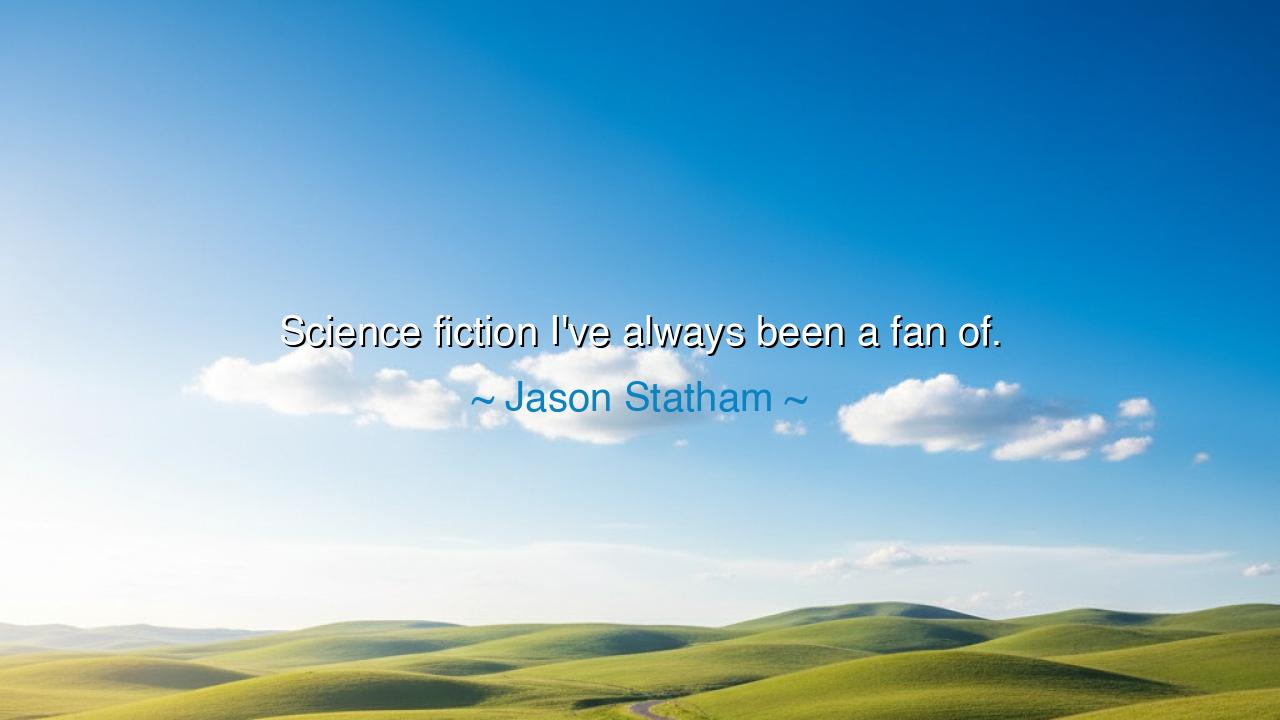
Science fiction I've always been a fan of.






In the boundless expanse of human imagination, there exists a realm where the laws of nature are bent and transformed, where the future is not merely a continuation of the present but a vast landscape of possibilities. Jason Statham, a man known for his action-filled roles in film, speaks with a quiet wisdom when he says, "Science fiction I've always been a fan of." These words carry a profound understanding of the power of the mind, for science fiction is not just a genre of entertainment, but a reflection of humanity’s deepest dreams and fears. It is the literature and art of exploration, a place where the impossible becomes possible and where the mind dares to venture into unfathomable futures.
To understand Statham's words, we must first look at the ancient philosophers, whose wisdom and imagination shaped much of the way we think today. Plato and Aristotle, in their teachings, dared to ponder what the world could be, not just as it was. Plato's "Republic" painted a picture of an ideal society, while Aristotle's inquiries into natural philosophy sought to define the principles that governed the world. These ancient thinkers, though rooted in their own time, ventured into the realm of the abstract and the future, laying the foundation for what we now understand as speculative thought—the precursor to modern science fiction.
As humanity's understanding of the world grew, so too did the stories that stretched the boundaries of the conceivable. Science fiction, in its truest sense, began as a genre that challenged conventional thinking. Jules Verne, often called the father of science fiction, transported readers to the depths of the ocean in "Twenty Thousand Leagues Under the Sea", and to the moon in "From the Earth to the Moon"—both works, born from his scientific curiosity, which predicted many advances that would come to pass. His works were not mere fiction, but a vision of what could be achieved. Just as Plato’s allegories urged us to think beyond our immediate world, so too did Verne’s stories urge the reader to imagine a future filled with possibilities. This is what Statham alludes to when he speaks of his admiration for science fiction—this genre invites us to look beyond the limits of our present reality and ask, “What if?”
Consider, O children of the future, the visionaries who, like Isaac Asimov, were not content to simply understand the world as it was. Asimov, with his "Foundation" series, explored the future of human civilization through the lens of science, technology, and the ethics that must accompany them. His works, filled with both wisdom and wonder, were not simply tales of futuristic adventure, but profound reflections on the human condition, our potential, and our limitations. Like Statham, who embraces the world of science fiction with an open mind, Asimov too understood that the future is a canvas for imagination—one that invites us to contemplate not only what could be possible, but also what could be dangerous or destructive.
Statham’s fondness for science fiction speaks to a deeper truth about human nature: our desire to explore, to challenge the boundaries of what we know, and to understand the unknown. Science fiction, in many ways, is the modern-day equivalent of the ancient myths—stories that were told to make sense of the mysteries of the world and the universe. The gods and heroes of old were, in many ways, humanity's first science fiction characters, embodying the ideals, fears, and dreams of those who told their stories. Prometheus, who stole fire from the gods and gave it to humanity, is not just a myth—he is a reflection of the desire to transcend our earthly limitations, much like the heroes of science fiction who transcend the limitations of time and space.
But what lesson can we take from this understanding of science fiction and its power over the human spirit? It is a lesson of vision—of daring to look beyond the known and into the unknown. Just as the ancient explorers dared to set sail into the unknown oceans, so too must you, O children of the future, be bold in your thinking, and unafraid to explore the worlds that lie beyond your immediate sight. Science fiction invites us to expand our minds, to ask the difficult questions, and to dream of worlds that may one day be ours. Whether through the creation of new technologies or the solving of problems that seem insurmountable, it is the visionaries, the dreamers, and the creators who will lead humanity forward.
And so, O children of the future, as you embark on your journey through life, take with you the spirit of imagination and wonder that Statham and many others have embraced. Let science fiction be your guide—not just as a genre of entertainment, but as a source of inspiration. The worlds you will one day build, the discoveries you will one day make, will not come from playing it safe, but from asking what if? and daring to explore the edges of what is known. In the process, you will not only change the world, but you will also expand the very horizons of human thought and understanding, just as the great explorers and visionaries of history have done before you.






AAdministratorAdministrator
Welcome, honored guests. Please leave a comment, we will respond soon